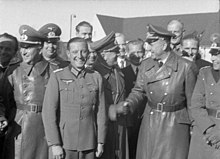Emil Leeb
Emil Leeb (born June 17, 1881 in Passau , † September 8, 1969 in Munich ) was a German artillery general and head of the Army Weapons Office during World War II .
Life
family
Leeb was the son of the Bavarian major Adolf Leeb (1844-1929). The future General Field Marshal Wilhelm Ritter von Leeb (1876-1956) was his older brother.
In 1905 he married Gertrud Schmid, with whom Leeb had four children.
Military career
Leeb joined the 4th Field Artillery Regiment "King" of the Bavarian Army as an ensign on July 7, 1901 , coming from the cadet corps . There he was promoted to lieutenant in 1903 and used as a department adjutant from 1909. From 1911 to 1914 Leeb graduated from the War Academy , which gave him the qualification for military rail service, senior adjutantship and the subject (fortress warfare).
At the beginning of the First World War , Leeb came into the field as an adjutant of the 1st field artillery regiment "Prince Regent Luitpold" and took part in the fighting in Lorraine and France. In 1915 he was transferred as second adjutant to the staff of the 10th Infantry Division . At the end of the war, Leeb was Captain First General Staff Officer of the 2nd Division . For his achievements he was awarded the Military Merit Order IV. Class with Swords, both classes of the Iron Cross and the Austrian Military Merit Cross III. Class awarded with war decoration.
He was accepted into the Provisional Reichswehr and in 1919 as an auxiliary officer in the Reichswehr Ministry. With the formation of the real Reichswehr, he was transferred to the 7th (Bavarian) Artillery Regiment . Leeb rose further within the Reichswehr, became a major in 1925 and commander of the second division of his regiment in 1929 and finally in 1931 commander of the 7th (Bavarian) driving division. On October 1, 1932, he was promoted to colonel . As such, he worked from 1933 until his appointment as commander of the 15th Division in Frankfurt am Main on April 1, 1935 as head of procurement at the Army Weapons Office.
On July 1, 1935, Leeb was promoted to major general and on August 1, 1937 to lieutenant general. With the XI. Army Corps , which he had commanded as Commanding General since April 1, 1939 , pulled Leeb, as part of the 10th Army in Army Group South , in the attack on Poland . After Karl Becker's suicide , he became head of the Army Weapons Office on April 16, 1940, which he headed until February 1, 1945. In addition, he participated in the working group lightning rods , a code name for the development of biological weapons . He also belonged to the supervisory board of the Reichswerke AG for weapons and mechanical engineering Hermann Göring .
In 1957 Leeb was one of the founders of the Deutsche Gesellschaft für Wehrtechnik , a lobby association for the armaments industry . Emil Leeb died in Munich in 1969 and was transferred to Waidring / Tyrol .
Fonts
- From the armaments of the Third Reich. (The Heereswaffenamt 1938–1945). An authentic report from the last chief of the Army Weapons Office. Mittler Verlag, Frankfurt am Main 1958. ( Defense technical monthly booklets supplements 4, ZDB -ID 525225-8 ).
literature
- Walter Reissinger: Leeb, Emil. In: New German Biography (NDB). Volume 14, Duncker & Humblot, Berlin 1985, ISBN 3-428-00195-8 , p. 50 f. ( Digitized version ).
- Othmar Hackl : The Bavarian War Academy (1867-1914). CH Beck´sche Verlagsbuchhandlung, Munich 1989, ISBN 3-406-10490-8 , pp. 507-508.
Individual evidence
- ↑ Othmar Hackl: The Bavarian War Academy (1867-1914). CH Beck´sche Verlagsbuchhandlung, Munich 1989, ISBN 3-406-10490-8 , p. 507.
- ↑ Reichswehr Ministry (Ed.): Ranking list of the German Reichsheeres. ES Mittler & Sohn , Berlin 1924. p. 138.
- ↑ a b c Ernst Klee : The dictionary of persons on the Third Reich. Who was what before and after 1945 . Fischer Taschenbuch Verlag, Second updated edition, Frankfurt am Main 2005, ISBN 978-3-596-16048-8 , p. 361.
| personal data | |
|---|---|
| SURNAME | Leeb, Emil |
| BRIEF DESCRIPTION | German general of the artillery and head of the Heereswaffenamt |
| DATE OF BIRTH | June 17, 1881 |
| PLACE OF BIRTH | Passau |
| DATE OF DEATH | September 8, 1969 |
| Place of death | Munich |
